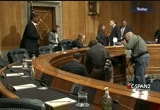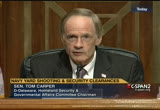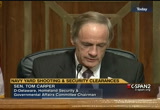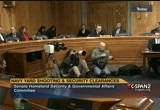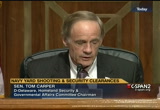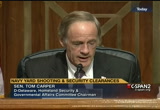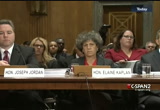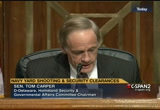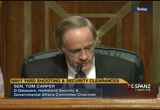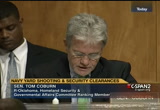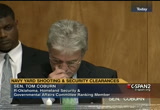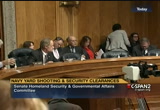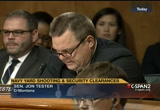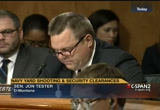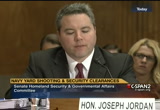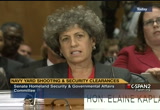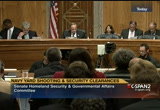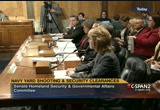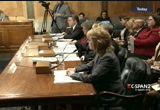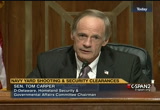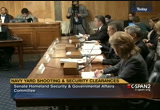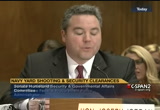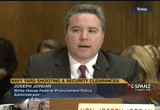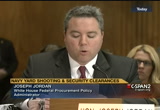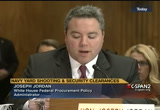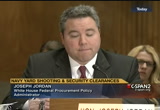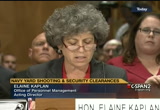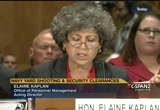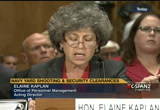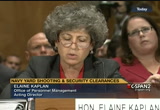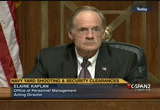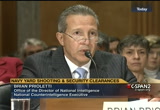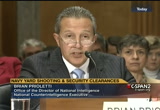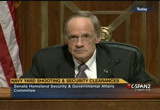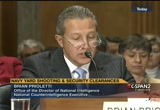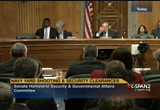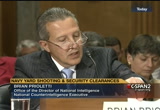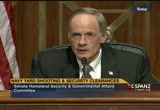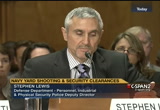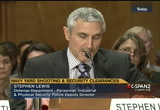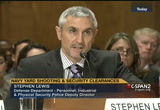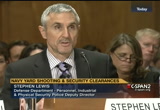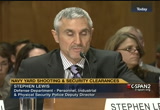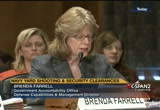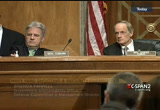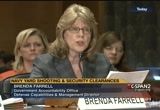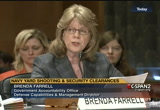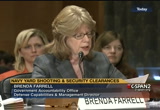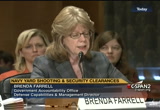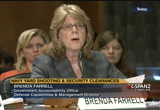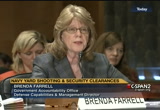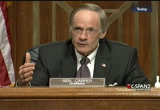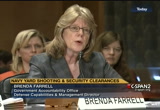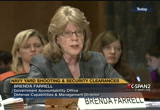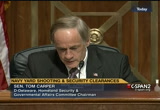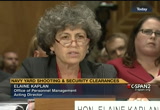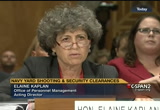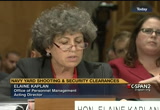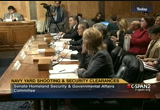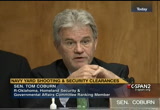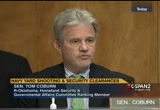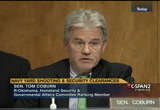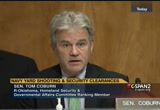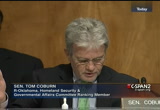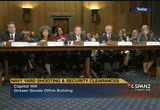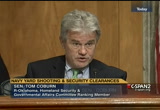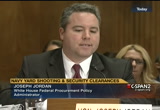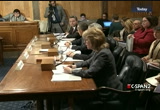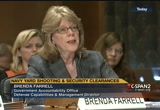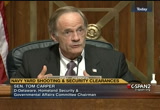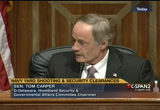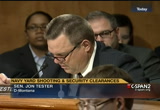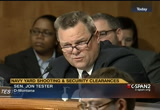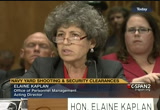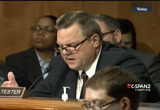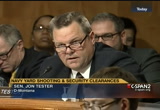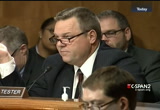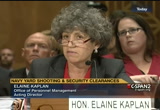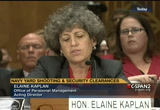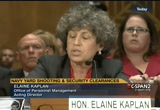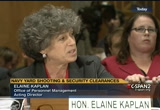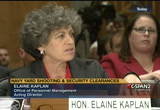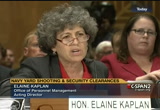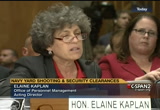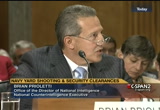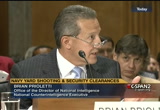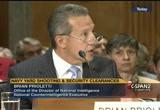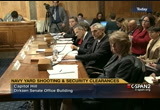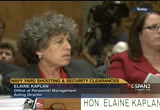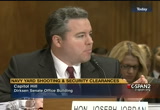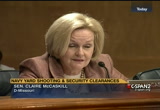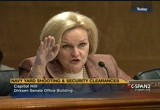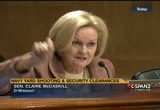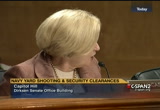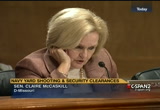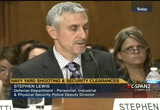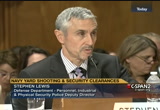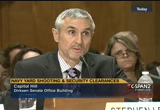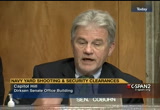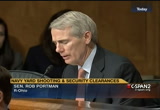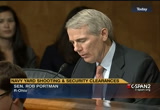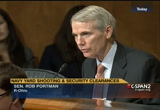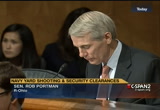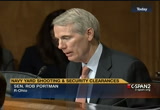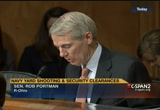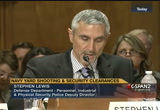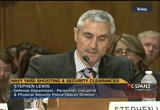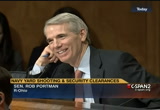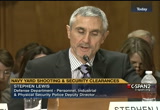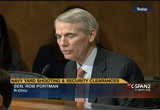tv Key Capitol Hill Hearings CSPAN October 31, 2013 8:00pm-10:01pm EDT
8:00 pm
points of view and include c-span video for your chance to win the grand prize of five dozen dollars. this year we have doubled the number of winners in total prizes. entries must be in by january 20, 2014. need more information? go to studentcam.org. thursday the son of homeland security committee held a hearing examining the shooting at the washington d.c. navy yard that killed 12 people trade witnesses include defense department and office of personnel management officials. this is two hours and 50 minutes.
8:01 pm
[inaudible conversations] >> good morning. the committee will come to order. welcome one and all. on monday september 16 a horrible tragedy unfolded in the navy yard in washington d.c.. a very troubled individual took 12 lives in a senseless act of violence. the circumstances that led to this tragedy are multidimensional. the issues raised by this tragedy such as the adequacy of our gun laws and the quality of mental health care are outside the purview of this committee. but as we have learned more about aaron alexis a number of my colleagues and i have been asking each other why such a troubled unstable individual
8:02 pm
possessed a security clearance from the united states government. why was he originally granted a security parents when he did not disclose his arrest record on his application? why did the investigator responsible for looking into that arrest rights quote retaliated by deflating someone's tires instead of disclosing alexis had shot those tires. we also wonder how such violence could have taken place at the navy yard which is more secure than just about any workplace in our country. in a br tragedy is not the only reason members of congress are questioning the quality of the background checks. the edward snowden case of course raises many of the same questions so have wikileaks disclosures by private bradley manning. just yesterday we learned the department of justice has joined a lawsuit against a company called united states investigations and services commonly known as uses. this is a company that performs
8:03 pm
8:04 pm
our primary purpose is to learn what we are doing right in the security process and do more of that while also learning how we can improve it. we have many questions to ask and here are some of them. are we looking at the right risk factors and incentives identify people who should not be trusted with clearance or who could do serious harm to our government and our country? what important information did that round checks miss in the current system which relies heavily on self reporting by the individuals applying for clarence? was a clearance granted and what
8:05 pm
events should trigger a re-examination of the individual suitability to retain that clarence? what problems are created by the heavy reliance on the office of personnel management? or the contract used to perform background checks? or the advantage of that? what is the relationship between background checks for security clearances and background checks for other types of privileges such as access to governmental facilities? we also need to ask what impacts sequestration in years of extreme bushes budgets have had on the clearance process. under the current system. about reinvestigation of individuals clearances are supposed to be done every five years for people with top-secret clearances and every 10 years for people with secret clearances. however because of funding shortfalls employees sometimes continue to work in positions that allow access to ossified information even if the initial period of clearance has lapsed.
8:06 pm
for example this summer for 10 weeks the department of defense has suspended periodic reviews of contracted employees due to funding shortfalls. i would like to hear from her witnesses about how often suspensions like that are happening across the federal government could i would also like to hear about what agencies are doing to manage risks to our security when clearances are not re-examined on schedule under the periodic review process. today we have been joined by officials from four agencies responsible for policies to determine who is eligible to obtain security clearance and access to government facilities and computers. they are the office of management and budget the office of personnel management the office of director of national intelligence in the department of defense. we want these officials to talk with us this morning about the critical security related policies and procedures and also about the coordinate coordinator reviews of these processes now underway throughout the
8:07 pm
government in the aftermath of navy yard tragedy and other recent incidents. we also will hear from an expert at the government accountability office affectionately known as gao which has produced a wide body of work on security clearance processes. welcome. this hearing builds on the ongoing good work of our subcommittees which held a hearing on security clearances just this past june under the able leadership of senators tester mccaskill and johnson. that hearing expose the urgent need for additional resources for the inspector general at the office of personnel management to enable that eiichi to conduct important oversight of background investigations. in july or committee approved a portion of the bill sponsored by senators tester and cosponsored by dr. coburn senator mccaskill senator portman begich johnson nelson and
8:08 pm
senator baucus to allow the inspector general to tap into opm's revolving fund for the purpose of reforming that much needed oversight and we commend senators tester and our colleagues for their good work. legislation passed the senate earlier this month. my hope is it will be signed into law by the president soon. in closing i want to say the vast majority of individuals who hold security clearances are honorable and trustworthy people many of them felt called to service after 9/11 to help protect their country and they deserve our thanks. having said that though we still must have a system that does a better job of rooting out those who become deeply troubled and unstable. that system must identify those with the hader signals and that system must identify those whose behavior signals and on acceptable risk to be entrusted to classified information are
8:09 pm
access to sensitive federal information. i hope that our hearing today will help point us to a number of sensible solutions that taken together would surely improve our national security. finally i think it's important to note that our committee continues to look at other aspects of the navy yard tragedy including the physical security of federal buildings as well as preparedness emergency response and communication issues. we have got much work to do and we will do as much as we can and learn from this tragedy and prevent similar ones from occurring in the future. let me welcome dr. coburn and say that i look forward to his opening comments and then we will turn to our witnesses. >> thank you chairman carper and welcome to our witnesses and let me extend my deepest condolences to the family's co-workers and friends of those lost on september 16. to me this isn't a political issue. this is an issue of us failing to do our job in a proper way
8:10 pm
when it comes to security clearances. today gao was releasing a report that shows some 8400 people received security clearances while they had tax debts which is a vulnerability that got security clearances and the vast majority of those were top-secret security clearances. so our process is obviously broken, not complete and not adequate. until this year opm did not even have the means of barring persons or companies that falsified background checks for clearances or the ig recommended 22 individuals have received no answer and 14 cases and informed the other eight would not be debarred. something is very wrong. it's unlikely that a stricter clearance process would have prevented a deranged individual
8:11 pm
from committing murder that this event should be a catalyst for congress to try to fix this way if this country handles access to sensitive data. two problems. one is too much stuff that is classified but doesn't need to be classified a number two they're way too many security clearances approved. if you markedly increase the amount of material that doesn't need to be classified you have to increase the number of people that need to have access to it. we need to address both problems. i look forward to going through the comments today with our panel of witnesses and get closer to the real answers and chairman chairman carper and thank you again for holding this hearing and appreciate the work of senator tester. >> thank you dr. coburn could i would ask senator coburn -- tester to make some comments. >> thank you chairman carper and i want to thank dr. coburn for his leadership on this issue as well.
8:12 pm
it was four months ago when we had the hearing after the snowden leaks that senator portman and i had and steven lewis works part of that panel and i want to thank you for being here as well as last time in my opening remarks given the fiscal security stakes involved we have to get it right and there is no margin for error. the fact was we knew then as we know today we need to make immediate reform of the process. it needs a more be more transparency in any scheme or oversight. the outcome of that hearing was the bill that the chairman talked about introduced by myself as well as portman mccaskill johnson and coburn. a provision of that legislation subsequently pass the senate and was signed into law. it's going to bring better oversight to the background as the investigations conducted by opm and its contractors that there are two other provisions
8:13 pm
that are also very important that we need to get across the finish line that go with the issues that senator coburn talked about with a number of security clearances given and quite frankly another issue that deals with what we do when we have a company that screws up and screws up with regularity. it's too important and we saw that with the attacks on september 16 when 12 good men and women left firm home as they did every other monday within a couple of hours, no warning and no motive for it they were killed by a man with a history of violence and criminal record. a man who was cleared by our government or a contractor is someone who should have access to this nation's most secure facilities in sensitive information. look, there are real-life consequences to the failures within our government and we
8:14 pm
need answers. we need solutions and we need action to close quite frankly the men and women who rely on that action deserve no less. i would say thank you mr. chairman for having this hearing. it would seem to me that it is critically important that we act as efficiently and as thoughtfully as possible to get this problem solved because it's obviously a problem and a big one. >> thanks for your leadership and good work and senator portman and others. we now turn to our panel. and i will introduce each of our distinguished witnesses. the first witness is the honorable joseph jordan administrator of the office of federal procurement policy at the office of management and budget. who do you report to? >> i report to beth coburn.
8:15 pm
>> it want to thank dr. coburn and other senator johnson and others and john cornyn was helpful in trying to expedite. >> she has a top flight leadership team. we expect it balanced budget in two years but our first witness is joseph jordan confirmed as administrative for procurement policy in may of 2012. he's responsible for developing and implementing contracting policies and is the senior leader and advisor to the omb direct or he will speak to on these role in the security clearance process. again we thank you for your testimony and for your service. next our witnesses elaine kaplan the acting director of the office of personnel management a position she has held since april of 2013. i understand she has been confirmed for a new job. is that true? do you want to tell us what it
8:16 pm
it is? >> yes i've been confirmed to be a judge on the united states court of federal claims. >> did any of us vote for you? >> some of you did. [laughter] the others were clearly mistaken. >> congratulations and thank you for doing double duty during the last six months and taking us on and our colleagues who were good enough to find their way to support a confirmed director, thank you for your support. as the acting director ms. kaplan oversees the office of federal investigative services. the's office is responsible for ensuring the federal government has a workforce that is worthy of the public trust by investigating and reviewing applications for security clearances and by performing background checks. whether suitable for the federal contractor. actor director kaplan thank you for your leadership and good luck in what lies ahead.
8:17 pm
next our witness is brian prioletti. is it prioletti? brian prioletti assistant director of special security director of the office of director of national intelligence. mr. prioletti is served in this position since may of 2013 after serving at the central intelligence agency for 1981 to 2013. the assistant director of the special security director mr. prioletti is responsible for leading the oversight and reform efforts of security plans process on behalf of the director of national intelligence. we thank you for that and we thank you for all of your service to our country and for joining us today. our next witness is steven lewis the deputy director for policy or industrial and fiscal security policy in the office of the undersecretary for intelligence at the department of defense. the undersecretary of defense for intelligence is responsible
8:18 pm
for dod policies programs and guidance related to among other things personnel and facility security. mr. lewis we thank you for your testimony today and we are delighted to note that mentioned dr. coburn in the audience today is his daughter sarah who for a number of years was my schedule -- scheduler and she told me where to go every day with relish and i usually went there. not always on time. we welcome both you and sarah. as the assistant director for special security director mr. mr. prioletti is responsible for leading the oversight and reform efforts and security clearance process on behalf of the director of national intelligence. i think i got out of order there but that's okay. i want to just say steve my understanding is that the secretary for the defense for intelligence is responsible for dod policies programs and guidance related to personnel
8:19 pm
and security. do you have a whole program? >> yes we do. >> how long have you been doing this? >> six years now. >> our final witness is brenda farrell director of defense capabilities and management of the government accountability office. in april 2007 ms. ferro was appointed to serve as director of gao's management team where she is responsible for military ends personnel process issues because. ms. farrell has federal -- we thank you for your testimony today and earlier before senator testers committee. turning it over to mr. jordan for his remarks we had a short -- before the hearing began. i say to our witnesses and colleagues and guess part of
8:20 pm
what we are trying to do here is figure out what is the role of government. what is the role of government and quoted abraham lincoln who used to say the government is to do for the people what they cannot do for themselves. david osborne moore recently said in a book that the role of government is to steer the vote not to erode the phot and today we are going to hopefully figure out what is the role of government and what kind of steering do need to do and who should be doing the rowing and how do we ensure we are steering better. mr. jordan you have roughly five minutes to give us your statement and if you go beyond that we will reign you in but if you stick to that we will be just fine. >> chairman carper ranking member coburn and members of the committee appreciate the opportunities are there for you to discuss the governance practices and procedures regarding security clearances facility access and suitability
8:21 pm
determinations. before i begin my testimony want to first a few words about the tragic events that occurred at the washington navy yard on september 16. on behalf of the administration my colleagues here today want to extend our deepest condolences to all of those affected by this tragedy. but nothing can bring back the love going to die that day it's clear collectively we need to do a better job of securing our military facilities in deciding who gets access to them. i and my fellow witnesses take this responsibility incredibly seriously and are deeply the imp personally committed to this effort could also want to note to assist with addressing the full spectrum -- >> i'm sorry to interrupt. i said five minutes but i am told you have seven minutes. you can take less but -- try not to take any more. >> i shall. [laughter] i also wanted to note assist with addressing the full spectrum needs of all individuals affected by the tragedy we established a
8:22 pm
recovery task force led by the assistant secretary of the navy for energy installations and environment. as government officials are highest duties to protect the national security including the confidentiality of classified information. simultaneously we have a critically important obligation to protect individuals performing work on behalf of federal agencies from workplace violence. we seniors with congress's help we have taken a number of important actions to strengthen protections of both national security information and the physical security at federal facilities such as improving the effectiveness of the since he backed down investigations and strengthening the processes by which agencies make national security a suitability determination. we must ensure those processes and the processes for granting or revoking access to facilities and information systems fully mitigate risks. we have a multisector workforce comprised military civilian and contractor personnel could we have worked to ensure that robust vetting policies are applied to all and officials with access to federal
8:23 pm
facilities networks were classified information to assist them better. this approach reflects two principles. first they need to protect our national securities no less critical in the work is performed by contractors and when it's performed by federal employees. second amend them and who make up the contractor worked for serna was patriotic and that government counterparts in fact many of had meaningful careers as federal employees in the armed forces. while we have made significant progress mary suitability security clearance and credentialing process reform we need to do more. in 2004 was passed the intelligence reform and terrorism prevention act which required all agencies to the -- in 60 days. as a result the executive branch is taken to meet the goals of that act i december 2009 compliance was achieved. we have consistently met these goals every quarter since on maintaining the standards expected of the clearance process and the backlog of investigations has been
8:24 pm
eliminated. reportedly executive branch reform efforts have extended beyond tiny goals. in order to align policies and practices and to establish enterprise information technology standards to improve efficiency and reciprocity we establish the stability and security clearance performance accountability counsel. it is chaired by omb deputy director of management accountable to the president for reform bills. as a marker of the significant progress made in 2011 gao remove dod's personal security grants program from its high-risk list however we recognize the serious nature of recent events and will continue to intensify efforts to strengthen and improve our existing policies and processes. to that and the present record on the two lead at 120 day interagency review of the suitability and security processes. for suitability and fitness the review will focus some of the process in adequate identify applicants based upon their character and past conduct may be disrupting operations or
8:25 pm
danger to the workplace be the focus on national security risk will center on determining eligibility and granting access that could lead to loss of classified information and damaged national security. additionally we will evaluate the means to collect share of process and store information that supports these decisions while emphasizing transactions among an equity shared across agencies. as part of these efforts will also be considering opportunities to improve the application of the standards procedures to contracting which may include as one example improved information-sharing between agencies is spending into barring officials in the office is responsible for making determinations for fitness and security clearances. our first interagency meeting is scheduled next weekend will serve to launch our review process. additional means will occur over the next few weeks and anticipate this review to be completed within 10020 daytime frame. once again thank you for the opportunity to testify. as i noted there is nothing more parton than the two goals of
8:26 pm
protectinprotectin g a people and are sensitive information. we have steadfastly worked in a collaborative manner to improve our processes and procedures to ensure the safety of oath. as recent tragic events of highlighted we must maintain a strong focus on continuous improvements and we will heed the president's call to conduct a conference of review and address any potential gaps in the most effective and quickest manner possible. we look for jordan with his his committee in congress as we undertake this important work creates. >> mr. jordan thank you so much. ms. kaplan please. >> chairman carper ranking member coburn and members of the committee thank you for asking me to be here today. the offense that occurred at the navy yard last month were heartbreaking. 12 civilian employees among them civil servants and members of our contract workforce were ruthlessly gunned down. all of these individuals were doing what millions of their colleagues in the federal workforce across the country do every day come to work to serve nay and people put food on their
8:27 pm
tables and provide for their families. as the acting director of the office of personnel management and the federal government's chief kirsanow officer i share your commitment and that of our president to identify and address the root causes of this terrible tragedy. i also share your commitment and that of my colleagues seated at this table to perfecting to the greatest extent humanly possibly our processes and procedures for determining who shall be allowed access to our nation's secrets and granted the privilege of serving it position of public trust will give them permission to enter federal buildings and facilities like the navy yard. to those ends since 2008 opm, opm dod and odni have worked together on eighth reform effort to ensure there is an efficient aligned high-quality cost-effective system for conducting background investigations and making determinations regarding security clearances and plays suitability and contractor fitness. we have made great progress as was reflected in the written testimony of the witnesses at
8:28 pm
this table. has mr. jordan mentioned we have eliminated that lack of security clearance investigations that in and and of themselves proposed a risk to our national security. we have dramatically reduce the time it takes to complete such investigations to meet the deadlines congress has established. we have composed reciprocity requirements with greater efficiency issued an investigative standards we are now preparing to implement. we have professionalized the training of investigators and adjudicators and we have worked together to implement gao's helpful recommendations by designing an eminently deploying a new set of agreed-upon metrics that we can use to measure and drive up the quality of our investigative products. at opm label implemented our own quality control measures and have an aggressive broken to hold investigators to the highest standards of integrity and to ensure that their work product is something of which federal agency should be able to rely with confidence.
8:29 pm
we have overhauleoverhauled and improve their processes for reviewing the work of our investigators increased our oversight staff and are retooling our audit process. we do not tolerate fraud or falsification. we have duguid look for it and in those few cases where we find it we take immediate administrative action and work as we have with their rg and the department of justice to pursue criminal sanctions against those who betray the trust that has been bestowed upon them. of course much more remains to be done. even the highest quality and -- the evolution of the security clearance process has to include the ability to obtain and easily share relevant information in a more frequent a real-time basis. nelson entombed approver capacity in machine readable form and to share with the federal government and state and law enforcement could could have the presence direction under the leadership of the directive on the opm will continue to work
8:30 pm
with his colleagues in the performance accountability counsel to conduct a 120 day review of the oversight implementation of national security credentialing and fitness standards for individuals working at federal facilities. our review will focus on steps to strengthen these processes. the tragic events at the navy yard as well as recent high-profile security breaches highlight the need to be vigilant in ensuring individuals entrusted with access to classified information and individuals with physical access to federal facilities and information do not present a risk to the national security or the safety of our employees and our work basis and to the end of improving our processes and procedures. i thank you for the opportunity to testify regarding these issues and i will be happy to answer any questions that you might have. >> ms. kaplan thank you for
8:31 pm
those encouraging words. mr. prioletti again thanks for joining us. >> good morning chairman carper ranking member coburn and distinguished members of the subcommittee. thank you for the invitation to provide information on the government's procedures regarding security clearances. i will address the role of the director of national intelligence knows is dni. as the security agent has responsibresponsib ilities for oversight and clearance process across the government in areas in need of attention and initiatives underway to address those areas. before i follow i would like to make the comment that we also add our teeth as condolences to family members for their loss and our commitment to work towards continuing to approve -- improve security processes and access capabilities of the united states government. executive order 13467 the dni is
8:32 pm
a security executive agent is responsible for the development and oversight of effect that efficient uniform policies and procedures governing the timely conduct an investigation and adjudications for eligibility for access to classified information or eligibility to hold a sensitive position. the dni serves as a final authority to designate agencies to conduct background investigations and determine eligibility for access to classified information and ensures reciprocal recognition of investigations and adjudications determinations among those agencies. i would like to focus on two essential components of the security clearance process the background investigation and adjudicative determination. the 1997 federal investigative standards as amended in 2004 of the current standards used to connect backgrounbackground checks are investigations. these checks are required prior to making a determination for
8:33 pm
eligibility for access to classified information or eligibility to occupy a sensitive position. the scope of the back and investigation is dependent upon the level of his security clearance required regardless of the type of clearance involved identified issues must be fully investigated and resolved prior to any adjudication. and adjudicative determination is based upon adjudicative guidelines issued by the white house in 2005. clearance decisions are made utilizing the whole person concept which is a careful weighing of availability and reliable information about the person both past and present favorable and unfavorable. recently two highly publicized critical events involving individuals with clearances highlighted areas in need of attention in the current security clearance process. the odni in collaboration with our colleagues here omb opm dod and other federal partners has
8:34 pm
been leading security clearance reform now for several years. although these efforts are still a work in progress when mature they will mitigate many of these gaps and enhance the nation's security posture. under current policies and practices individuals continue to eligibility for access to classified information relies heavily on a periodic investigation. essentially background investigation and adjudication conducted every five years for top-secret parents in every 10 years for a secret parents. the time interval between periodically investigation leaves the u.s. u.s. government uninformed as to pay for that potentially poses a security risk or counterintelligence risk. continue evaluation as a tool that will assist in closing this information gap. ce allows for ongoing reviews of an individual with access to classified information or in a sensitive position to ensure that that individual continues to meet the requirements to eligibility.
8:35 pm
cu as envisioned in the clearance process includes automated record checks of commercial databases government databases and other lawfully available information. a number of private studies have initiated to assess the feasibility of automated record checks and the utility of publicly available electronielectroni c information. marsh research is required at this time to assess resource impacts and determine the most effective practices. gave robust ce capability will support an informed the insider threat programs for it we must build an enterprisewide ce program that will promote the sharing of trustworthiness eligibility and risk data within and across government agencies to ensure that information is readily available for analysis and action. another area in need of attention is consistency and the quality of investigations and adjudications. the revised investigative standard when implemented will
8:36 pm
provide clear guidance on issue identification and resolution. in addition the odni opm and dod are cochairing a working group developing common standards and metrics to evaluate background investigations for quality and comprehensiveness. furthermore the odni has hosted a working group to refine the adjudicative guidelines and recommendations regarding these guidelines and policy development phase. another initiative supporting a more robust security clearance process was the development of the national training standards which were approved in august 12 of the dni and director of opm for implementation in 2014. the standards create uniform training criteria for background investigation. excuse me, background investigators national security adjudicators and suitability adjudicators. additionally omb odni and opm are working to revise standard form 86 questionnaire for
8:37 pm
national security positions to improve the collection of that information pertinent to today's counterintelligence concerns. as a final note for the presence directive omb is conducting a review of the security and suitability processes. as such the dni opm and dod will review the policies processes and procedures related to the initiation investigation and adjudication of background investigations for personal security suitability for employment and fitness to perform on a contract trade and closing i want to emphasize the dni's resolve to continue the collaborative efforts established with omb dod and opm and our federal partners. we thank you for the opportunity to update the committee at this time and let over to working with you on these matters. >> mr. prioletti thank you for that update and we look forward to hearing from mr. lewis. >> good morning chairman carper
8:38 pm
ranking member coburn and distinguished members of the committee. i appreciate the opportunity to appear before you today to address the practices and procedures of the department of defense department of defense regarding secured a clearances facility access and background investigations. the undersecretary of defense for intelligence dr. michael vickers is the principle staff assistant to the secretary and deputy secretary for security matters. in this capacity.vickers exercises his authority as the senior official for dod's personal security program and has the primary responsibility for providing improving guidance oversight and development for policies and procedures governing the civilian military and industrial base personnel security programs within the dod. in order to address the department's personnel security policies i believe it's important to identify the level policy framework.
8:39 pm
executive order 13467 designates the director of national intelligence is the security agents with the responsibility to develop uniform policies and procedures to ensure effective completion of investigations and determinations of eligibility for access to classified information or hold national security. this includes reciprocal acceptance of those determinations. in addition the executive order designates the director of the office of personnel management as the suitability executive with responsible before implementing uniform and consistent policies and procedures regarding investigainvestiga tions and adjudications relating to determinations of suitability and eligibility for physical access to federal government systems. finally the executive order creates an accountability counsel chaired by the deputy
8:40 pm
director for management at omb and including the dni and director of opm with responsibilities to a line suitability security and is has appropriate contractor fitness investigative and adjudicative processes. with regard to the oversight roles within the dod they had to dod components are responsible for establishing and overseeing implementation of procedures to ensure prompt reporting of significant derogatory information unfavorable administrative actions and adverse actions related to personnel. this needs to be provided to appropriate officials within their component and as applicable to the dod consolidated adjudications facility. this responsibility applies to military servicemembers dod civilians and contractor personnel. under the national industrial security program cleared
8:41 pm
contractors are required to report adverse information coming to their attention regarding employees. in addition defense security service is responsible for conducting oversight of companies clear to perform on classified contracts for dod and 26 other federal departments and agencies that use dod industrial security services. the department has worked very hard to create improvements that have produced greater efficiencies and effectiveness in the faces of initiating and adjudicating background investigations. as a result in 2011 the government accountability office removes dod security clearance program from the high-risk list. we have used multiple initiatives to review and confirm the quality of the investigative ruddock's we received quality of our adjudications and the accuracy and completeness of the
8:42 pm
documentation of the adjudicative fresh now which is the basis for these determinations. this helps to support our oversight as well as reciprocity. in addition we have implemented the certification process for dod adjudicators and over 90% of these adjudicators are certified to rigid standards and ultimately a condition of employment that each adjudicator will complete the certification process. in may of 2012 deputy secretary of defense directed the consolidation of all adjudicative functions and resources except her the dod intelligence agencies at fort meade maryland under the direction and control of the director of administration and management. this decision was made in order to maximize deficiencies realized by the co-location of the adjudication facilities under the 2005 realignment and
8:43 pm
closure and effective october 1 5002 assumed responsibility to adjudicate background investigations which are the basis for the issuance of common access cards used for physical access to dod installations and to access dod information systems. thank you for your time and i look forward to answering your questions. >> thank you very much. brenda farrell, great to see you and welcome. >> thank you chairman carper ranking member coburn numbers of the committee thank you so much for this opportunity to be here today to discuss the federal government's personnel security clearance process. let me briefly summarize my written statement for the and to some extent what has already been conveyed here today prayer and personnel security clearances allow for access to classified information on a need to know basis. recent events such as the
8:44 pm
unauthorized disclosure of classified information has shown that there is much work to be done by federal agencies as you know mr. chairman to help ensure the process functions effectiveeffectively and efficiently so that only trustworthy individuals hold security clearances. over the years gao has conducted a body of work on personnel security clearance issues that gives us a unique historical perspective. my remarks today are based on a report issued from 2008 through 2013 on dod's personal security clearance program and governmentwide reform efforts. my main message today is the quality and importantly quantity metrics needs to be built into every step of the clearance process. my written statement is divided into two parts. the first addresses the overall security clearance process. multiple executive branch agencies are responsible for different steps of the
8:45 pm
multiphase personnel security clearance process that includes one determination of whether position requires a clearance and two application submission. three investigation. four adjudication and five possible appeal if a clearanceclearance s denied or revoked. for example in 2008 executive order 13467 decimated the dni is the security except that agent. as such the dni is responsible for developing policies and procedures to help ensure the effective efficient and timely completion of background investigations and adjudications relating to determinations of eligibility for access to classified information. in turn executive branch agencies such as dod that accounts for the vast majority of personnel security clearances determine which of their positions military civilian or
8:46 pm
contractors require access to classified information and therefore which employees must apply for and undergo a clearance investigation. investigators often contractors for opm conduct these investigations for most of government. opm provides the resulting investigative report to the requesting agency's for their internal adjudicators to make the decision as to whether not the person is eligible to hold parents. in 2012 we reported there were issues with the first step of process determining which positions require access to classified information. we reported that the dni and security executive agency had not provided agencies clearly defined policy procedures to consistently determined if a position requires a clearance or established guidance to require agencies to review and validate existing federal civilian positions. we recommended the dni in court
8:47 pm
nation with opm issue such guidance and odni concurred with their recommendations. i'm pleased to say odni and opm have actions underway to address our recommendations and we will continue to monitor their actions. the second part of my statement addresses the extent to which executive branch agencies have metrics to help determine the quality of the security clearance process. for more than a decade gao has emphasized the need to build and nurture quality throughout the personnel security clearance process to promote oversight and positive outcomes such as maximizing the likelihood that individuals who are as security risk will be scrutinized more closely. for example gao reported in 2009 that with respect to initial top-secret clearances adjudicated in july 2008 for dod documentation was in complete
8:48 pm
for most opm investigations. we would independently estimate that 87% of 3500 investigative reports that dod adjudicated were used to make clearance eligibility decisions were missing some required information such as verification of all of the applicants employment. we also estimated that about 12% of the 3500 reports did not contain the required subject. in 2009 we recommended opm measure the frequency with which the investigative reports met federal investigative standards and are in order to improve the quality of investigative documentation. as of august 2013 opm had not implemented this recommendation. finally, i would like to note we initially placed dod's current program and are high-risk list
8:49 pm
in 2005 because of delays in processing clearances and we continued that designation until 2011 when we renewed dod's program in large part due to the significant progress in reducing the amount of time to process the clearance and steps dod had taken to ensure the quality of the adjudication process. at that time we noted the executive branch efforts were underway to develop and implement metrics to measure the completeness of opm's investigations provided to dod. unfortunately these efforts have not been realized. the progress that was made with respect to reducing the amount of time to process clearances would not have been made possible without the committed and sustained oversight by congress and the executive ranch agency leadership. further actions are needed now to oversee quality at every step in the process including
8:50 pm
background investigations. mr. chairman this concludes my remarks and i will be pleased to take questions when you're ready. >> thanks so much. we definitely have work in this area. after a ask questions of dr. coburn we will recognize senators tester and in the following order senator i got senator landrieu senator mccaskill and senator -- some of those folks have slipped out. they will come back. i want to start with you this farrell if i could greatly appreciate very much your formal testimony. i would like to a less formal conversation. of the things we have heard from each of our witnesses the changes being made and reforms that are being adopted what should we feel especially good about? >> i think the collaboration between dni and opm and other agencies has improved over the years. i think when we started this work back in 2005 looking hats timeliness issues there was not a lot of collaboracollabora tion
8:51 pm
and communication going on. i think executive order 13 foreigners and 67 that established the performance accountability council and appointed the deputy director as the wind be at the chair help provide the governance -- governance structure for that collaboration to continue. the most notable improvement we have seen is with the processing of initial personnel security clearances at the top top-secret level. there are no metrics for the processing for other aspects such as the periodically in best occasions and again are concerned has been and we have stated this over the years since 2005 that we do not want to see the processing of the clearances at the expense of the quality of the investigations. >> all right. of the work that is in progress some of which we have heard discussed today, would you talk
8:52 pm
with us for a little bit about what are some of the most important aspects of that work better in progress and with a thought of how we in the legislative ranch can be the most helpful and expediting a network that's in progress? >> yes, i think the work of the agencies are doing to revisit the investigative standards is very important. this gets to the heart of what we are saying about quality. buy quality we mean for the background investigations in particular trade area are we obtaining the right information, the best available information from the resources? is a complete and is it reliable? i think the revisiting the federal investigative standards and seeing if there are new techniques or new information that needs to be included and perhaps some needs to be excluded since the standards go back decades. that is i think a very good focus. first determine if you're collecting the information you need for the background investigations and then make
8:53 pm
sure you have metrics for the completeness of that information. see the second half of my question is the oversight committee to tidy make sure the work that is in progress and the most important is accomplished. your advice to us? >> part of the reason why we sought progress with the timeliness issue was due to congressional oversight as i noted in my opening statement. also at that time the intelligence reform in terrorism prevention act of 2000 for required an annual report to congress for an interim steps to meet the final goal for processing clearances within a 60-day period. the good thing was it wasn't something that happened overnight. there were interim steps for the executive branch to take to meet that 60-day goal. that annual report reflected information on timeliness to help make sure that they were meeting those interim goals and
8:54 pm
if they weren't meeting them with that they do to make a course correction in order to continue that significant progress? there was a sunset clause on that annual reporting and we have not had the same type of oversight for the remainder of the reform efforts as we did for timeliness so i think this may be an area either through reporting or continued congressional hearings with interim steps to meet the goals. one of the areas we mentioned on metrics in may 2010, several of the executive branch leaders signed a memo to some congressional leaders noting these are the metrics that we have under development that we are planning to put in place and discovered not only timeliness but the investigations and the adjudications reciprocity. a lot of these metrics dealt with quality of the process but
8:55 pm
those metrics as i have noted with the exception of timeliness , we have not seen those be fully developed and this is something that we would like to understand why not and if not with the metrics metrics and what the plan was in may of 2010 and what is the plan? >> thank you. i wanted tony down a little bit if i could on the issue of quality control. yesterday at the department justice joining a lawsuit against the united states investigations of services commonly known as usis a company that performs almost half of all investigations contracted out by the office of personnel management. the case alleged the sent back to opium investigation reports that were not complete in order to maximize profits, a practice that i previously referred to. ms. kaplan if i could pay this lawsuit comes on top of the questions raised about the investigations of aaron alexis
8:56 pm
and edward snowden. are we at a crisis point with credibility and integrity of the security clearance process? what should give us any faith in the current system? >> i appreciate the question and i certainly understand it based on the reports that have appeared. as you mention senator on tuesday afternoon a full claims act report was unsealed and it contains very serious allegations of contract fraud arising out of a contracted to listen to thousand 10 and 2011. we have been aware of these allegations and since the complaint was filed in july 2011 and we have been working closely with the og -- doj and ig to implement changes to ensure would not continue. let me explain to you what we understand the allegations to be. we understand the allegations to be the contractors have an obligation under the contract to
8:57 pm
conduct their own quality reviews of investigations. once they finish their quality reviews they send the product to opm and we conduct our own quality reviews of the investigation. what the allegation is here is that in order to move cases more quickly usis did not conduct its own quality reviews and that is a real problem obviously if the allegations are substantiated because its contract fraud because they were certifying that they were completing the quality reviews. it's also real problem because we rely on their quality reviews in order for us to be able to move the investigations along more quickly. we like them to catch issues and fix them before they send their reports on to us. i will say maybe it's of little comfort that the cases that were to use the phrase dumped for cases that also were subject to opm quality review so it's not that the cases were never reviewed before they were passed on to the agency. that being said we have done a number of things as soon as we
8:58 pm
became aware of what -- of the allegations. with respect to opm we have significantly increased the number of government personnel performing contractor oversight by increasing the number of people at the fte levels and realigning our internal staff. we have increased on-site inspections with contractor review including the comparison of their process to the requirements of the contract. we have increased the frequency of the audits of cases closed by the contractor. we have developed a new report to detect instances where quality reviews may not have been performed according to the terms of the contract as is alleged to have occurred here. we have conducted inspections on the average number of reports being reviewed and released by the contractor review staffer trend analysis so we can find anomalies. we have removed former uses of officials involved allegedly
8:59 pm
involved with the misconduct from the opm contract and we are currently in the process of re-competing for support services contract which is also held by usis to preclude the concern that there might be collusion between the support staff and field investigators and i was a recommendation of our inspector general. lots of things have occurred at usis. >> mai tai music spired and i want to be respectful of my colleagues. to sum it up in one more sentence and then i need to recognize dr. coburn. >> a lot of changes have been made at usis. there is a new ceo there and chief compliance officer and integrity standards. there have been a lot of changes made since the events revealed in the complaint and that has given us some level of comfort and confidence that we can rely on these -- trust but verify. >> trust but verify. well said. dr. coburn. >> thank you for your testimony.
9:00 pm
at a kind of see this as a multitude of problems. i mentioned it in my opening statements. we over classified which is a problem for the american people because it's not transparent. and sitting on the intelligence community i get to see what is top-secret highly classified and compartmentalized. one of the other things i see is in five different instances we have people who are doing the investigations are also doing the adjudication. ..
9:01 pm
half have a top secret clearance. the american people ought to be asking what in the world is going on? and my question is, we've now seen outline who'd is ultimately responsible for it. that is the dni, correct? >> and we have the defense department that is making improvements but still has a way to go. we have failure with contractors not doing allegedly, not doing what they're supposed to be. there's also another ig investigation going on along with that. what is the answer? one of the answers has to be doing the job that we do better, one, number two, the other has to be is using data that is available, you know, the form
9:02 pm
-- where is that form? this form for $20 you get 90% of the information on the internet that is in the form. we pay $24 00 for top secret clearance; is that correct? that's about what we pay. $24 00. >> for top secret more than that. a little over $4 ,000. >> okay $4 ,000. for a secret, what do we pay? >> about 262. >> okay. and for $20 you can find out 90% of this stuff online right now. and so the question is maybe we need to step back and say -- first of all we have too much stuff classified and too many people who have to have clearance. how we're doing it is not utilizing data out there today is ready available. number three, we've had response from the director clapper they're going -- start coordinating with the irs.
9:03 pm
that is the most people would say that's a kind of no-brainer. that's one of the things you want check. it's in the form. after you paid your taxes. looks like nobody ever cross referenced with that the irs. nobody checked to see with the data is accurate. all that is is a computer check. i guess my question to you, and my final point is this: creating the expectations that your clearance is tentive on the basis that you pass some type of renewal and not knowing when it's going to be, the cia used to have random polygraph tests. they don't even have random polygraphed tests. they are noticed. i can pass it with two drugs in me. you'll never know it. we need to create an environment, number one, we lessen the number of people that need a clearance. we do a lot better clearing and
9:04 pm
create the expectations you're going to be randomly checked to see, if in fact, you deserve to have the clearance. that's the system. and the details are different -- i'm not saying it's not difficult, but how we do it and how much it costs and holding contractors accountable for the job we're paying them to do doesn't seem to be happening. and my question -- i would like a response from you all. how do we solve this? you all laid out where we are with but how do we solve it? we have all of these areas, you know, the form -- this form three pages of instructions, seven pages where you live. 17 pages of employment, 4 pages of military, 29 page on relationship, 21 manages on foreign activity, two pages on emotional health, 7 pages on police reports, 8 pages on drugs and alcohol, 5 pages on -- an i
9:05 pm
know you are reforming the form. the disappoint what we want to do is go for the gold. and not all of this -- first of all, is checked from a quality assurance check, and number three, -- number two would be is can we create a process that getses to the gold and not rely on the form as much as we can data that the government already hold. i'm amazed -- are you all amazed that 8800 people in this country have a tax debt that makes them vulnerable to bulging top secret data? they have clearances today. does that bother anybody here? that puts us at risk. so my question is, whoever wants to answer my broad commentary or at least educate me in a different direction, i would love to have it.
9:06 pm
>> the contractors are doing both the investigations about adjudication that would be a really bad system. the adjudication is not done by the contractor. it's done by the agency that is granting the clearance. so i just wanted to -- [inaudible] no. those are -- that's an inherently governmental function. it's not something we entrust to a contractor. i believe i'm right about this. sure. [inaudible] from the clearance process fop me it would seem that the clearance process in of itself is inherently government function. not just the adjudication but the investigation. any comment on that? >> i'm going turn it over to mr. jordan. >> the collection of information. the analysis is not inherently governmental function as
9:07 pm
director cap lynn said. the decision, the adjudication is an inherently government function. it should be formed by deposit employees. the to your earlier question, it goes to the nature behalf we're doing in the coordinated interagency review. how do we get the right data to make the right decision? so continuous evaluation with spoke of is very important piece automated record check we can build out the capability there. very important. building efficiency and effectivenesses furthering boast those in the system. and making sure we're constantly looking at the processes in the end spectrum from initiation through the and adjudication and on ongoing basis to make sure that we address any gaps any weaknesses as quickly as possible. we have about 5 million people with security clearances, and you noted several instances but they are few.
9:08 pm
the issue any single point of failure has moment tal negative consequences we need do everything we can to make sure we don't have a single one. >> i've not heard everybody say anything. i think we agree we classify too much stuff. you all disagree with that? what is the answer to that? because once you create something that is classified, the only people who can work on it is a people who have a clearance for the classification or above. what is the comment? what is gao's response on that? >> we have -- that's a separate issue from the people part. but we have done work in the past looking at the potential overclassification of materials, and we do have work just started looking again at the potential over classification that does relate to the first step of the personnel security clearance process. determining for a position needs to have access to classified
9:09 pm
information. that's where those types of trade-offs could be made. there's a misperception often that security clearance follows the person. it doesn't. it follows the position so as we have noted there's been a lack of guy dance in the area. we did work at dod and dhs components with them both of those department. we found that some components took initiative to revalidate existing positions and some did it one time and no plans to do it again. some never did it. so from a personnel security clearance process view, that very first step is very important make sure that the position does require access to classified information. that's where the type of questions could be asked what is that classified information. if you overclassify and overclassify positions it starts
9:10 pm
to snowball effect of having 5 headline people who have cleerns out. >> i'll wait until the second round. sorry. i hope i did the math right. the 4.9 million people have clearances. that's about 0.16% that apparently owe the government money. most are on a repayment schedule. we don't know. how manifully they are. but the october 40% of those that are repayment schedule. that means about 0.1% owe government not on a repayment schedule. that's not good. compared to what? compared to 99.9% who have a clearance who don't owe the federal government on anything on taxes. >> would you yield for a
9:11 pm
minute. >> sure. >> he raises the question it's not about percentage. it you're not following the law in term of paying your taxes, why should you have a security clearance at all. whether you have a payment plan or not? you have not complied that exist every other american citizens to comply with. you have a security clearance? to me it begs the question you're not up to dpait on the taxes. you're no longer have a clearance. period. it's creating the right expectations is my thought. >> good. the other thing i would say. i spent 23 years of my life as a active duty naval flight officer. every time i had a $1 to say we have too much stuff overclassified. it's an age-old problem. do we need to classify.
9:12 pm
we have done good work. and senator mccans school and other we thanks. >> thank you, mr. chairman. i think the bigger issue of the taxes paid is pretty basic. what else is going on out there that are slipping through the cracks of security clearances? because taxes, i mean, that's right in front of the faces if we're missing that. mr. chairman, just a followup with the senator's comments. i think we have pushed in the committee the reinvolving phone dollars to be allowed for more tran parent sincerity and audit and accountability. the house committee passed it and the house hasn't. i would encorning you to do what you can do with the counter part in the house make sure that the full house take it is up. it's clitically important. there's two other pieces to the bill that are a part of. and deals with accountability
9:13 pm
9:14 pm
and people are dying because of it. we're losing critical information because of it. the list goes on and on. so what is going on? >> thanks for the question. i'm not aware that anymore at opm saying there was no problem with it. i do know that because of the fact that the compliant was undersealed. we were unable to talk about the complaint. now we can talk about the complaint which i think is a god thing. and i think what we have tried to do is explained to senator carper before and this started before the complaint became publish and over the last several years to address and rectify the problems that are revealed in these allegations in this complaint which was underseal. and as i mentioned, we have done many things at opm to prevent
9:15 pm
this from happening again. this is contract fraud. a fill your to do quality review they were obligated to do under the contract. and there have been many, many changes made at well. many changes that involving the whole new staff at the top. all sort of things. >> when were the changes made? gloafort last two years. since the allegations in the complaint. we have been working with the ig and the justice department and so we feel that, you know, the allegations are certainly very disturbing, and what we've tried to do is address the underlying concerns without speaking publicly about them. >> and so you guys -- i'm not an attorney. but they have been sealed but you have known what is in the charms you just can't talk about publicly; is that correct? >> i can tell you right now, in fact you can go online probably my. >> i don't care about now.
9:16 pm
i care about july of 2011. were you aware of the charges? be we knew what were the allegations were and the complaint; however, working with the justice department and our ig, we were, you know, advised of course not to discuss it. it was a matter of -- >> that's school. that's fine. i guess the real question here is 60% of the background checks; right? >> i think it's 50. >> there's three companies that dot contract perhaps they are.cc the lion's chair -- share of it. was there any additional oversight given as of july 1 on the work they were doing? how often was it done? and, by the way, are those kind of metrics used now on all of them? because quite frankly, when money is involved, obviously, there's some folks that don't give the damn about the product and want to make the money. >> that's a good question. what we've done it's not just oversight of uses because we have over contractors and federal employees quited frankly who do the work. they need to be -- >> what determined what background checks go to them and
9:17 pm
the other -- these guys do some things particularly well and other things not so well? and you just doll them out like a deck of cards or what? >> i don't think it's like a deck of cards. i don't know what the -- ly get answer to you on the question. i suspect it's based on the location of the investigation. it's not as though they do the top secret. >> and what, i mean, you i believe it was you that talked about quality metrics that might have been brenda too. what determines what background checks you look at to see if they are done appropriately? >> we look at all of them. each -- >> so you look at them. you looked at alexus's background check? >> yes, we did. >> well, would you like me to talk about the alexis? >> you can. the information is out there. the naval record alone should have brought up red flags. what you're saying is two folks missed it. but the contractor --
9:18 pm
the contractor missed it and you missed it? >> well, to be clear, i would have to say based on our own review and the review the alexis investigation yes, we all missed something for sure. but we if what was required. >> multiplesomes. i want to make sure because it's important get to the root call of this. and we understand what every each part of this. we did the investigation what we're looking at right now in the cob terrence of the review and what we've been looking at is well, are the standards of to snuff? should we be required to get
9:19 pm
police reports, for example? should we be required to get mental health information? all the thing need to be looked at. it was not, in our view, a case of malfeasance on the part of the contractor. we believe the contract der what they supposed to do. >> with this secret clearance there's an fbi check done. we get the fbi data base and the fbi reveals arrests it frequently doesn't reveal the dispositions of cases hangedded at the state and local level. the fbi record revealed that mr. alexis had been charged and arrested for what was called malicious mischief. and under the existing standards, our job or the job of the contractor in this case was
9:20 pm
to go out and find out what the dispositions of the charge. and find out more information about the charge. some have questioned now why opm investigators did not go get a police report. well, the reason the police report was not obtained was because they have different rules about what they supply to us. and in this case, we had experience with seattle, seattle did not provide police reports. and they have their own good reason. i'm sure. but so what we were referred to by the seattle was this state data base. the state of washington, their court records. that's where we went. and that reveal that mr. alexis was charge but the charges were not -- >> i appreciate i'm over time. can i ask you. who do an oversight look at -- how many do you find a problem with? >> don't have that information.
9:21 pm
i can get it for you. if there's a problem, and there's all kinds of different problems. we try to get the contractor to fix the problem, for example, if incomplete. if there's a problem if the adjudicator looks at the investigation and feel it's inadequate. they can ask us do more work. >> this is -- we can be here all day. we should be here all day. it's important. >> thank you. senator ayotte. >> thank you, mr. chairman. i want to thank you for hold holding the important hearing. let me follow up as to what senator tester said. as i understand it, so in the case of mr. alexis, opm did actually go the seattle police department to get the underlying police report? >> no. they can d not. -- we did not because we do a lot of investigations and our understanding was that seattle didn't name kind of information available. they routinely referred us the
9:22 pm
state of washington data base. that's where we went. we didn't try to get the underlying police report. we just -- the decision of opm was just that we've dealt with seattle in the past, they won't give us a report. well with there is certain -- our obligation to find out the dispositions or charges. it's not if we decided we're not going make an effort. based upon the fact in the past -- it occurs with other jurisdictions they will refer us to another data base. that's what they did. we did not go -- in this particular case and say you depart from the policy. but, you know, just this is, again, something that we need take a close look at. we are going to take a look at for the president's respriewp there was information written on a piece of paper somewhere we didn't have access to. >> yeah. i find it actually incredibly shocking that we wouldn't pursue a police report in any of the arrest situations. because the nature of the charge
9:23 pm
looking at the underlying police report having been a prosecutor can tell us very different information, and a prosecutor may not have the element to make a particular charge and the dispositions may tell us nothing. but, you know, seeing prior behavior here where aaron alexis would flagged a different -- i believe we have to change that that we have to get the underlying reports. if that requires coming to an understanding with laimplet -- law enforcement across the country. i would be shocked having worked with so many police officers they wouldn't be willing to have an understanding with the federal government on this given what is at stake for the country. you know, one of the things that concerned me also as i heard the discussion between judge, between you and mr. tester was this issue for the uses lawsuit. and in 2011 coming before the
9:24 pm
committee. i wasn't a member of the committee then. but the fact that this suit was sealed and as a result of consultation with justice you didn't feel because of the feeling of the suit years old share that information. what i would be critical of is why wasn't there -- this seems to me, a core issue of oversight that the committee would need to know that was the subject of this yield suit that now we're seeing obviously some of the consequences of perhaps part being uses obviously with snowden and with what we're seeing in other cases. and it really troubles me to think it's sealed. was there any discussion about was it an important piece of information that the committee needs to know. i have a real problem the
9:25 pm
justice wouldn't have gone to the court and taken action. thing is mart of a bigger issue. i want to get your thoughts on nap did you come subsequently and update us as soon as you could once this thing was unsealed. >> i'm here today, just unsealed two days ago. >> fair enough. >> in other words it was sealed for two years. >> well, and, you know, i'm not an expert in this. and thank you for calling me, judge. even though i'm not a judge yet. i appreciate. [laughter] i'm not an expert in this. but this is, you know, a false claim act case. they have a very special treatment because somebody comes forward as a whistle-blower then the government -- to keep it under seal because the government wants to dpdz whether to intervene in the case. and so i think that is the reasoning behind this. >> so -- but that's -- >> understanding there is --
9:26 pm
we have a separate responsibility and we have got to get to the bottom of this. i believe the is an important issue we have to get at. >> if you would yield. i think the real question is now that you have the problem out there, the response i would say, is why were we monitoring quality assurance on the contractors to begin with? what have we done since then to monitor quality assurance on the three characters -- contractors out there doing it? >> that's a fair question. with respect to what we were we doing before? i've been told that actually we were sort of hot on the heels of this around the time that the complaint was filed. because we were starting to notice that the quality reviews were being done either too much by one person or too quickly. and so we already made inquirer
9:27 pm
rei with uses. but obviously we didn't catch it quickly enough. it occurred. what we've done since then is we've had we focused on the reported enable us to find anomaly when the problem was occurring more quickly. we briefed up the the staff working on the matter. and at the same time they made many, many significant changes in the way they operate and so there have been a lot of changes made. and with respect to the question about not being able to talk about it, in some ways it was very frustrating to us as well. because looking at things in the newspaper, and unable to, you know, -- be i think that you have to ask the justice department more about it. i think they believe it's required by law. >> thank you. i think obviously it's something we need to work through so we're not in the situation in the future.
9:28 pm
9:29 pm
>> what i was referring to is we do automated record check at the time. or electronic record checks. all the government agencies do it at times. for example, when director cap lynn referred to the police check going to the electronic record check to get the information. there ongoing processes such as that going on right now. okay. what i was referring to is we've continued evaluation is an expansion of that in to more areas that include in the proceeding here. but what we're talking about is building the enterprise. in other words have an addic record check ability, continue
9:30 pm
use evaluation whether it be several times over a five-year period or more frequently than that that can serve both the united states military units, or serve the intelligence community as well as serving the nontight 50. what we have done is had a ce -- if i may use the term, continuous evaluation working group. that was made up of ic members, omb had representation, dod had representation. organization such as the ic but also reasonable for the expectations of an -- nontitle 50 organization or some of the other organizations. that is a very touchy balancing
9:31 pm
act to make sure that we have enough checks. but it's an expansion on what is currently done. director mentioned there's national agency checks, police checks, and financial checks for the secret clearances. we've expanded them to cover other areas. some data bases include classified information some do not. as well as the commercial data bases. the areas i think with you are most concerned about the social media publicly available information. that's where the research is being done, senator. we have to find the balance between the civil liberties and privacy of the u.s. citizens versus national security interests. that is where we're doing it. i do not have as a representative of dni, the luxury of going to a social media or public-available data base, pull information out, and submit it as being the truth. the government has a responsibility, an obligation to
9:32 pm
every one of citizens to ensure that the information is true and accurate before we use it in an adjudicative process. >> i know my time is up, but i can tell you obviously when our teenagers go online and get possibility information on social media and yet we're not going use it to find out that someone is involved in something. i think that is a little hard to believe. we need to take a common-sense approach to this. my time is up. i also think we need to have random checks on people instead of just relying on their own self-reporting. >> thank you, senator ayotte. >> thank you, mr. chairman. thank you, ranking member. i think it's a critically important response and quick response to the horrible tragedy. i hope that the family members take some comfort that we too share their concerns. i've read this report, and i can tell you honestly as somebody who used to do background checks for people involved in gambling in north dakota, if you were
9:33 pm
going get paid minimum wage to deal blackjack, he would not have passed that background check. he could not have dealt blackjack in north dakota. but yet he had a clearance that allowed him to come ton a navy base and do serious, serious human damage. and so it's really frustrating. we're all frustrated here with this process, and i completely appreciate your privacy rules, but when you apply for this clearance, you waive your right to privacy. and every parent on this panel who deals with social media knows if you want to know what your kid is doing go on social media. you may think it doesn't have the voracity of a court record, i can tell you as somebody who looked at court records repeatedly doing background checks, it certainly does. and, you know, a picture is worth a thousand words. it's heart breaking, and so we take this one example and i always fear that one example does not prove the case.
9:34 pm
but we have gotten multiple examples now where we failed in the clearance system to actually for the out people who do damage to the -- damage coworkers -- murder coworkers but also damage to the national security. it's a very broad issue and very important issue. i want to talk about self-reporting. i want to talk about the consequences of not self-reporting. we -- i was quite honestly shocked. i'm new to the committee and looking at government clearances. the huge number of people in the country who have the clearances. i mean, this is a big group. we all agree with that. obviously random checks are critical and important part of this. you see that from the bill we introduce. we need to make the self-reporting more effective as well. i want to know of the millions of people who have the clearances, how many have ever been dangered from the --
9:35 pm
discharged faa -- from the government for failure to self-report? >> we can get you that information. we don't have it with us. >> how -- if your data base, how would you know that information? >> well, if, for example, someone fails to report -- do you mean on the form they are deceptive? >> either ply -- lying on the application or after failure to report on a series of events that occurs after the fact. >> we have to get you the information. the latter is certainly grounds for invoking a security clearance. and the failure to report or being dishonest to when you fill out the form is something that the adjudicator take in to consideration. >> and in . >> but, but with all due respect if you're not checking local police records. you have no guarantee. you --
9:36 pm
>> with respect that, there's never guarantee. but we don't just take their word for whether they've been arrested. we do an fbi check, and once the fbi data base, which is police reports -- yeah. probably more familiar than i am, frankly. it will spit out whether someone has been arrested. we do the followup. it awrve -- often requires work on a state-by-state basis. and let's remember we're talking about in the case a secret clearance. it it was top secret clearance there would have been a more extensive information -- investigation done. which would have uncovered the gun part of this and maybe other things. it's speculation but it's a secret clearance. >> if i can take it one step furthered. we're talking about revoking the clearance. what about requiring that employment be terminated? is that -- is that one of the things you're considering in looking at going forward that person obviously for contractors that's a tough
9:37 pm
call. but certainly for government -- employment to me it's not enough to revoke the clearance. i think it should be pry ma fascia a case you now lose your job. there has to be serious consequences for not reporting. there has to be serious consequences for lying. we have to to look at the number of people not self-reporting. even random checks cannot solve the problem. there has to be true consequences. i'm interested -- anyone in the panel, about how we ample -- amp up the penalties for employees not self-reporting. >> you know, that's absolutely what we're looking at as part of the 120-day inner agency review. both the piece you were talking about where are there any gaps at the self-reporting portion versus an active -- reinvestigation period would address. that's in scope. what is the information that we collect, and, you know, measure it against the 13 adjudicative
9:38 pm
standards. does it flow right? that's all part of it. then the accountability there are currently significant penalties for, you know, lying or not reporting adverse information. yes, it includes revocation of your clearance. you mentioned contractors. an agency can, you know, suspend or bar the contracting firm if they think it's a problem with the individual. they direct the individual not work on the contract. or you can suspend or disbar the individual. you look at the accountability measures for both federal employees and contractors to make sure that only the people who should have access to our facilities, our sense of information do at any given time. not just when cleared. >> and, you know, just human nature being what it is. if simply saying, well, there might be a consequence or -- the point that i'm getting at is a mandated this is going to happen. if you don't self-report. and mr. contractor, we don't
9:39 pm
know this, it's your job to help us enforce. it's your job to report back to us. if you don't, black mark on you. you boant won't be a government contractor very long. that's the level at which i have passion for the issue. we should not be letting -- when we give them the good housekeeping seal of approval, which is what the security clearance is, that ought to mean something. if they breach that it this ought to be something we very serious with serious consequence. i applaud your work. i would like to know how many have been dangered or disciplined for lying on application. obviously they wouldn't get the clearance. but not reporting after the fact. mr. chairman, again, thank you for the time. >> thank you. those are tough questions. tough questions. senator mccaskill. >> i think one of the most vealing things is the realization while an arrest report may be part of a background check, there's not an
9:40 pm
requirement that the underlying police report be obtained. and i'll tell you why this is a shocking revelation. like senator ayotte, i'm a former prosecutor. and the vast majority of cases that would reveal a mental disturbance will not have a dispositions. because the mentally ill really, from the prosecutor's standpoint, if they haven't hurt anyone. putting them in prison sometimes create more problems than it solves. most prosecutors, when they are confronted with a mentally ill issue, like someone who said they've heard voices. someone where the police have been called to a motel room on a disbushes -- disturbance when someone says there's microwaves coming through the vent and people are
9:41 pm
here to get me. they will do a police report, and most of the time the police department won't even try to file charges. that is a disturbance call that is related to someone that is -- in their mind, they do it all the time. now that is not something that especially in a city as large as seattle or kansas city or st. louis. that kind of disturbance call where someone is making a racket because they are mentally disturbed mostly the department is willing to take it to the prosecutor for dispositions inspect fact, we are horrific in this country with even getting the person the mental health services. and the vast majority of the shootings are not going to be around the issue of whether or not someone is showing violent tendency or whether or not they've shown tendency of having a mental issue. so the notion that we are
9:42 pm
saying, well, if a police department won't give us a report -- we've checked the box. and i think if we do a gun check on the issue we are realize a lot of work we've been doing around this has been checking boxes. now i get it we can't go out and do one-on-one and pull every threat on every application for clearance. although we did that we probably would make them so extensive we would be disciplined about deciding who gets them. but the notion that you're calling what you're doing quality control is probably, i think, offensive. because i think there's a lot of checking boxes going on. was this report obtained? yes. was this obtained? what i don't have confidence is that there is even on a random basis a more thorough
9:43 pm
examination. what i would like to see us do as a committee is ask for some specific recommendations on who is getting clearances and are they all necessary? all of this is risky. i mean, we can say that we're doing too many and then we could have a bad thing happen. then we would be back here saying why didn't they have a security clearance. on the other hand, what we're doing now is the worse of all situations because we are giving the impression that all of these millions of people who have security clearances we've checked them out! we're confident they're mentally stable, they're not criminals, and they obey the law. we have no idea if that's true. we are clueless as to whether or not that's true. because this process has become, in a way, a pro forma kind of
9:44 pm
process. and the reason the contractors are off the reservation, they bid an amount and the contractor wanted to make money. that was time to cut corner. you wanted to make the number and the money. you don't have to do the whole thing and pretended like you did. so i agree with the chair and the ranking member this is time for all of us to really, you know, quit nibbling around the edges on this thing. let's goat meat of the matter. saying seattle doesn't give a police report. that dog doesn't hunt in this context. that just doesn't work. i have a specific question for you, mr. lewis. my subcommittee learned we have a bunch of felons on navy installations. we have learned that the navy was giving these contractors 28 temporary passes at the get go
9:45 pm
without any checks on any anybody. is that true? >> this was a subject of a dod-ig report. and the navy has looked in to these specific circumstances. i believe there are about 50 people identified who were convicted felons who were given access without the proper checks, and the navy has taken corrective action removing individuals who did not warrant access from the installation. in other instances, given the date that some of the felony convictions were quite old made a decision to allow them to continue to have access. ..
9:46 pm
>> are you saying they are doing something before the temporary pass, or are they getting the full compliment of checks? >> for installation access, there's two basic criteria. one is someone who will be on the installation of the temporary basis. those individuals require a degree of vetting, the check against criminal records check and terrorism data base check. for individuals who are going to have ongoing access, there is a requirement for a national agency check with written inquiries and other checks which
9:47 pm
is the minimum standard for that issue. >> we corrected the problem someone was getting temporary passes without any checks? >> yes. >> and is this going on in other branches, temporary passes with no checks? >> we're not aware of that, but we are certainly engaged with components on this particular issue. >> okay, well, i'd like a report back that this is not going on in any other of the branches. >> yes, ma'am, we'll do that. >> thank you, my time expired, mr. chairman. >> a follow-up for information, whoever made the decision to allow that to happen, to go around, were there any consequences to that individual that made the decision? >> there's an ongoing navy review of what occurred at the navy yard that day to include all aspects that went into that, and that's an ongoing review.
9:48 pm
>> could we hear back from you, this committee, when the review is completed as far as the consequences of the person who made that decision? >> the navy review, the overall dod reviews, and other reviews that are being conducted will be brought together in an omb final review of the over arching security practices, and i expect that to be part of the review. >> yeah, well, my specific question is a report back to the committee was somebody held accountable from going outside the conserve? that is a real problem, accountability in federal government. it's accountability. all i want to know is what is the result? did we hold whoever made that decision accountable? >> i'd appreciate if we close the loop at the end of the day.
9:49 pm
>> we'll do that. >> all right, thank you. senator portman, please, welcome. >> thank you, appreciate you holding the hearing, and it's instructive because there's troubling issues, and had the opportunity to hear from some senators who have a lot of interest and background in this. we've held hearings, you know, in june regarding background investigations, and specifically the inability of the inspector general to effectively audit the fund and the background investigation process, and that's the score that was dwped, and senator mccaskill is here, senator tester, and chair and ranking member and others, and i'm pleased to be able to get that done. just a couple weeks ago, it was off the senate floor. it's a small step, but it fixes that i.t. issue. a friend worked with us on that,
9:50 pm
and we want to follow that and make sure it's cleaned up. there's another hearing in a few weeks to continue looking at this issue and others and senator tester was here to stay on this at the subcommittee level. i'm going to focus on something that i think is critical to get at this issue, and i guess the tragic example recently is the perfect example of it, but it's not a new issue. it's the issue of continuing evaluation, and whether it's the five-year cycle or ten-year cycle, this, to me, is the critical issue that we're missing, and we saw it not just with regard to the navy yard, but also with this rickey elder case, the specialist, rickey, who in 2012 shot and killed his
9:51 pm
commander officer and turned the weapon on himself. his clearance timeline was rem necessary sent. his background evaluation done in 2006. over the next five years after 2006, charged twice with apsalm, one dui hit and run, felony assault, none reported in the personnel security chain, and after receiving a clearance, received nonjudicial punishment for unauthorized absence in jail, disorderly conduct, and another nonjudicial conduct for drunk and disorderly, a month prior to the incident that would have highlighted his mental health problems, and none of these triggered reevaluation of classified material, classified
9:52 pm
facilities, none of those, and i think this is every issue here today is important, but if we don't get at this interim period between a clearance and whether it's a five or ten year cycle, the next clearance, we'll continue to have tragic incidences. in 2005, interesting, a year before rickey listed in the army, two years before aaron enlisted in the navy, seven years to the date before rickey elders' deadly attack, the department of defense testified to this committee, and this was in june of 2005, about the automated continuous evaluation system, aces, and you all said you'll going to continuing evaluate the security clearances, led in your written statement, i think, you said it in the written statement, you noticed the three years earlier in 2008, three years later from the 2005 testimony you gave before this committee, in 2008, president bush directed by
9:53 pm
executive order an individual's been determined eligible, currently has access to classified information shall be subject to evaluation. that was an executive order back in 2008. i know we've heard today, you know, working on this, i heard in response to the question, we have an interagency working group, developing a con cement of operations -- i wrote this down -- doing research, and this has been going on for a decade. testified in 2005 it was going on in 2004, maybe more than a decade. five years after the executive order, eight years after the plans, and we're dealing with the tragedy at the navy yard, so i don't know who would like it talk about it, maybe you can talk about dod, and, by the way, you're also talking about putting something in place, but not for another three years. it would be dod only, so i guess i'd like to hear what's
9:54 pm
happening. there's progress on the report, pilot projects, 3600 personal records searched and it's working, 6 a of the 3600 have been suspended or revoked due to derogatory discoveries, and algorithms found problems, but 3600 people is a drop in the bucket with over 5 million people with security clearances, so and it's been ten years that this committee was told, and i quote, data testing results and lessons incorporated into a capability basis to be in place by the end of 2005. here we are in 2013. so taxpayers paid $11.6 # million for this in the years of 2012-20 # 14. i don't know the development costs or the costs after 2014 to
9:55 pm
fully demonstrate its capability at dod. can you explain the reasons why this capability takes over a decade to field? can you give us some sense of the total cost for this, and what it's beginning to cost to go over at the department of defense? >> i can't speak for the total cost, i have to come back, and there's evaluation systems being used, and there's queries of government and data sources and analytical capability to flag issues of concern so that's an existing capability. as you mentioned, it was used in an army project, and out of 3300-odd individuals, the total of 100 personnel actions taken as a result of information identified in the queries. in addition, there's a
9:56 pm
developing concept demonstration that takes this a step fiewrt, so aces, the automated continuous evaluation system, does a one-time snapshot in time query, this concept demonstration would have realtime updates so that as information became available, it would be pushed into the system, and the con september demonstration is scheduled to run from april of october of 2014. the anticipateed population would be 100,000. cleared military civilian, and contractor personnel, and so we're anxiously looking forward to completing that concept demonstration. in the interim, we're using aces for continuous evaluation
9:57 pm
checks, again, testing the concept, getting more validation, looking at things like privilege users and some other groups of contractor employees, so this is an ongoing effort. we get results from it on a regular basis, and we are looking to take that to the next level in terms of a true continuous evaluation giving feedback to the system for development. if an individual is arrested tomorrow, the system pushes it back to dod rather than waiting for dod to make the query. you were not here nine years ago when we heard it was in place by 2005, but you're here now, and so, you know, one question i could ask you is why is it taking song, and you might say, i don't know, i was not in charge, but you're in charge now, and you're saying that you're going to have this fully
9:58 pm
operational in three years; is that correct? >> for the automated cons yows evaluation system as it currently stands, it is -- it's operational system, it's still in a research and development mode, but it is an operational system. you know, limits right now -- >> i mean when i say "operational," i mean it would cover more than a small percentage of the people who are in between clearances. i mean, you're talking about taking it from 3600 up to 100,000 and how many security clearances do you have at dod? >> we have about 2.5 million people who are eligible and in access for classified information. >> when are we going to cover those people? >> the system and one of the things we are examining is can we expand the capability of the system to handle that larger volume?
9:59 pm
that is is work in progress. >> do you have a report? >> yes, we do. it's -- we need to address what happens between investigations, and -- >> so what are you looking for in order to get this done? you're going to get back to us as to what the costs are. >> e yes. >> have you sought additional funding? is that what you're thinking is the problem? >> it's a question of having the right criteria in place to conduct the evaluations and then what we do with the data once it's generated from the system. you evaluate that and how you take action based on that information. >> my time is up, and i apologize, mr. chairman. i think we have to have answers on this because if we don't fix this problem, you know, the initial clearance is incredibly important and talked about the need for records and so on, but if there's an interim period not keeping up with what's happening, and in the case of
10:00 pm
aaron alexis, it was clear as day, but yet there was no system to incorporate the data, so i, to on the intelligence side, i want to hear what you're doing too, but we don't have time to get into it right now with this question, but get back to us in writing with what you are doing, and talking about dod here, and then, finally, i hope that you can help us on this, you know, establish the metrics, come up with a timeline that makes sense, looking for additional resources or something, let us know, but if it's going to take another ten years because we're doing more pilots and more research and so on, that is unacceptable. thank you, mr. chairman. >> thank you, senator. senator coburn, and i'll wrap it up. >> can you explain to me the difference in the field work contract and the supply services contract you have with the aces, one, and number two, are contractors completing background
91 Views
IN COLLECTIONS
CSPAN2 Television Archive
Television Archive  Television Archive News Search Service
Television Archive News Search Service 
Uploaded by TV Archive on

 Live Music Archive
Live Music Archive Librivox Free Audio
Librivox Free Audio Metropolitan Museum
Metropolitan Museum Cleveland Museum of Art
Cleveland Museum of Art Internet Arcade
Internet Arcade Console Living Room
Console Living Room Books to Borrow
Books to Borrow Open Library
Open Library TV News
TV News Understanding 9/11
Understanding 9/11
